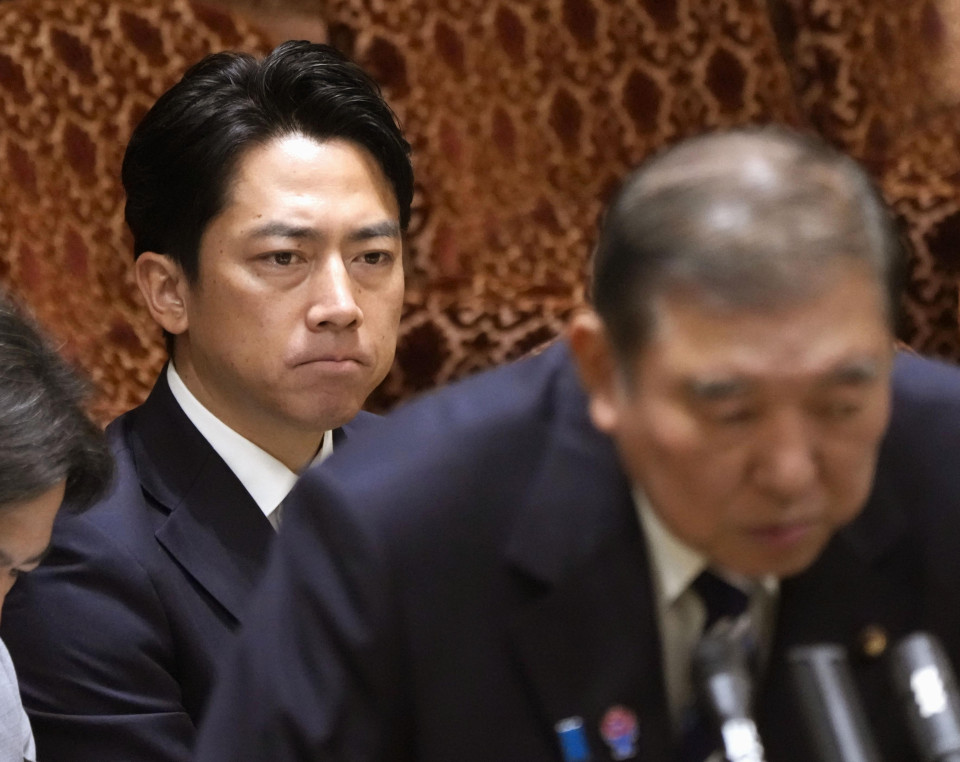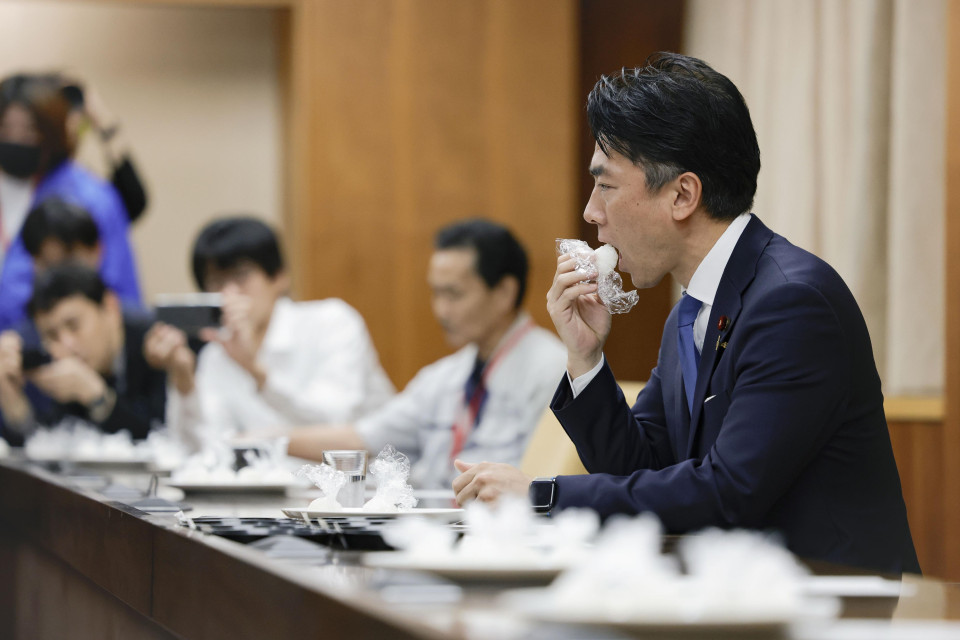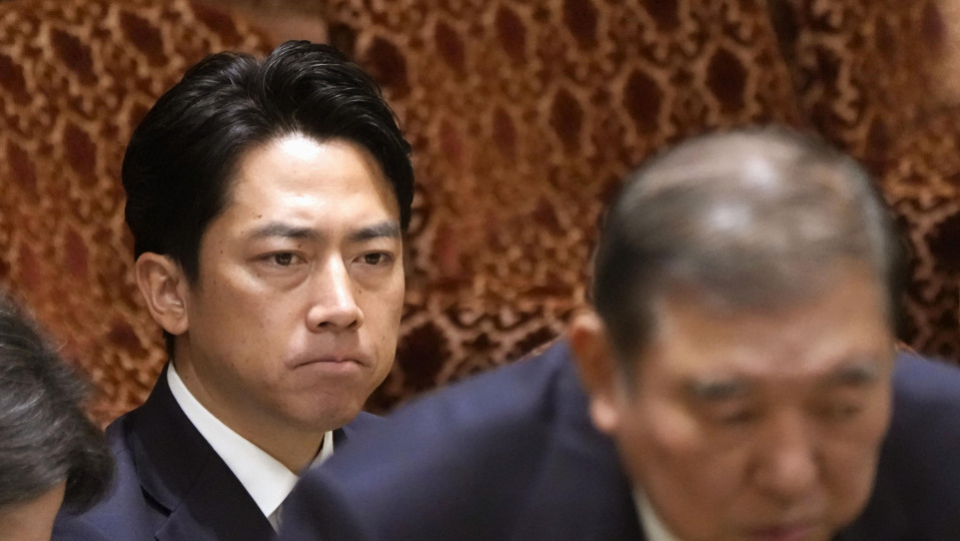Japan’s farm minister Shinjiro Koizumi has returned to the political spotlight by launching a push to lower rice prices amid rising household burdens, in a style reminiscent of his father, former Prime Minister Junichiro Koizumi.
The turnaround comes as the 44-year-old’s prospects were widely seen as written off after he finished third in the ruling Liberal Democratic Party’s leadership race in September, hurt by a perceived lack of experience and remarks some jokingly refer to as “poems.”
But some analysts say his theatrical style, strong media presence and resemblance to his father’s reformist approach could make him a lifeline for the LDP as it faces this summer’s national election with a public frustrated as price hikes outpace wages.

Minister of Agriculture, Forestry and Fisheries Shinjiro Koizumi (L) listens as Prime Minister Shigeru Ishiba speaks during a House of Councillors Budget Committee session in Tokyo on June 2, 2025. (Kyodo) ==Kyodo
The leadership of the LDP, headed by Prime Minister Shigeru Ishiba, “chose to use Shinjiro Koizumi’s communication skills and fame to turn misfortune into a blessing,” said Hiroshi Shiratori, a professor of political science at Hosei University.
A telegenic lawmaker who has represented his father’s former seat since 2009, Koizumi took over as agriculture minister on May 21 after his predecessor resigned over a gaffe in which he said he “doesn’t buy rice” because supporters give it to him.
Koizumi has quickly taken a series of steps including releasing government stockpiled rice at about half the market value through direct contracts with retailers, drawing attention to a wide range of controversial issues in the agricultural sector.
“He’s been more effective at capturing the public imagination than the LDP expected,” Shiratori said, describing the upcoming House of Councillors vote and the Tokyo metropolitan assembly race in June as “rice elections.”
“If the LDP can win the elections, lawmakers may begin to see him as their best option as leader,” Shiratori added, as a recent Kyodo News survey showed Koizumi favored as the next prime minister by 15.9 percent, ahead of Ishiba in fourth at 7.3 percent.
The shift has been stark for Koizumi, whose popularity has waned since he entered politics, due in part to mockery for his “poetic” turn of phrase and his comment as environment minister that tackling global warming “should be sexy.”
Pundits say part of his renewed appeal lies in his pivot to the kind of “theatrical politics” synonymous with his father, casting himself as a “hero” delivering cheap rice to consumers in opposition to the supposed interests of the agriculture industry.
As Koizumi moves to take aim at Japan’s entrenched and opaque agricultural distribution networks and their political ties, former farm minister Tetsuro Nomura criticized him, saying he “must remember the rules” when advancing policy.
Nevertheless, Nomura, a veteran lawmaker who has close links with agriculture sector-related groups, received backlash as the public has not supported politicians viewed as protecting outdated vested interests, ultimately boosting Koizumi’s standing.

Japanese Agriculture, Forestry and Fisheries Minister Shinjiro Koizumi eats a rice ball during an event to taste the government’s rice stockpiles at the ministry in Tokyo on May 29, 2025. (Kyodo) ==Kyodo
Disregard for political orthodoxy was a key tenet of his father Junichiro Koizumi’s media-savvy strategy. His penchant for punchy slogans helped him win the 2001 LDP presidential race on a pledge to “break” the party’s old power structures.
During his five-year tenure as premier from 2001, he secured a landslide victory in the 2005 snap election, framed as a referendum on his belief that the post office must be privatized — a reformist platform that echoes in his son’s agricultural policy.
Toru Yoshida, a political science professor at Doshisha University, said some voters prefer reform to come from within the LDP and Shinjiro Koizumi “wears the mantle as his father once did,” adding, “In this sense, the two are dead ringers.”
Linguistic parallels have also emerged, with the son mirroring his father’s language in his apparent quest to change agricultural policy, saying his appetite for reform spares “no sacred cows.” Skepticism, however, is growing over whether his momentum will last.
“If all the noise is found to have done little to resolve the central issue of lower living standards, the public could feel they were misled. Then, voter anger could boomerang back to Koizumi, with negative consequences for his political career,” Yoshida said.
Related coverage:
Nearly 60% expect rice prices to fall with new farm minister: poll
